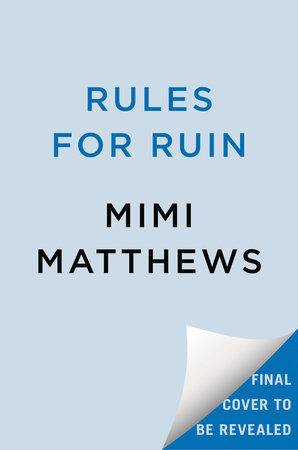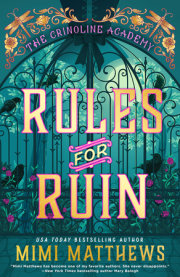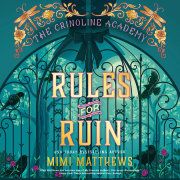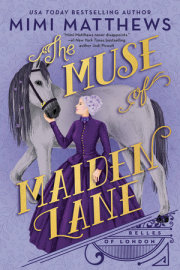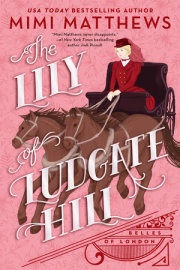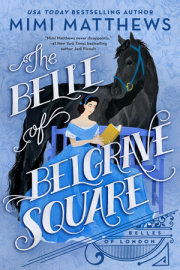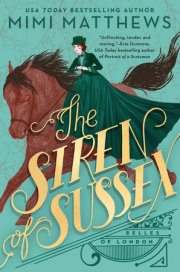1
May 1864
Gabriel Royce leaned back in the oxblood leather wing chair behind Viscount Compton's carved walnut desk as though the desk, the library, and the stately Grosvenor Square mansion itself belonged to him. The jacket of his immaculate black-and-white evening suit was open, exposing the white tie and black silk waistcoat beneath. "Seems easy enough to me," he said.
His casual posture was belied by the menace of a Birmingham drawl edging his words. Over the past decade, he'd taken great pains to cultivate an upper-class accent-a necessary skill when dealing with the narrow-minded aristocrats with whom he regularly did business-but whenever his temper threatened, the truth of his origins always managed to seep out.
In those moments, there was no hiding where he came from. Though Gabriel had made a kingdom of St. Giles, it was the Black Country where he'd been born and bred, and where he'd spent the first years of his life. He'd only come to London as a scrappy orphan lad of twelve, eking out a place for himself in the Rookery with his wits-and with his fists.
Lord Compton paced the library carpet in front of Gabriel, his brows pulled into a furious scowl. He was a well-favored man in his middle fifties, with graying brown hair, a full graying beard, and a slightly thickened, but still athletic, figure that spoke of good wine, aristocratic sport, and a life of unutterable privilege. Like Gabriel, Compton was clad in elegant evening wear, though his suit of clothes had likely been made in Savile Row rather than by a struggling back-slum tailor.
"Easy, you call it?" Compton echoed in dismay. "To welcome you into my home? To permit you to associate with my friends? My family?"
Gabriel was mildly entertained by the viscount's distress. The man was usually unflappable-a model politician, with a thoughtful tone and a somber manner. "Come now, your lordship. It isn't as though I'm asking to marry your daughter."
Compton turned on Gabriel in the circle of light cast from the oil lamp on the desk. His face was transformed by fatherly outrage. "You go too far, Royce."
"Not far enough, it appears, if you think you have the choice of refusing me."
Compton snorted. "And have you unleash your band of ruffians on me?"
The distant strings of an orchestra drifted from the ballroom above. It was mingled with the muted murmur of voices, and the thump of footsteps as late-coming guests continued to arrive. A polonaise had been playing when Gabriel had first entered the library, followed by a country dance. Another dance was starting now. A spirited galop, which (by the sound of the stomping upstairs) had been joined by a crushing number of couples.
Compton's ball was the first truly tonish party of the social season. The grandest people in London were reputed to be in attendance-illustrious lords, wealthy ladies, and powerful politicians. Compton and his wife had already welcomed most of them when Gabriel had turned up, unannounced and uninvited.
For a few coins, an obliging footman had shown him to Compton's library. The viscount had marched in moments later to find Gabriel seated behind his desk, dressed for the evening's entertainment, and possessing all the deceptive patience of a hungry wolf waiting to strike.
Watching the viscount now, Gabriel's mouth curved in a lazy smile. "If you don't do as I ask, my ruffians will be the least of your troubles."
Compton's expression turned stony. He was no coward. It took guts to walk the reputational tightrope he'd been traversing these many years. But, audacious as he was, he knew his limits. He would do as Gabriel wished in the end. The result was inevitable. It was only the speed at getting to that result that appeared at issue.
Unfortunately for Compton, Gabriel's patience was wearing thin.
"Is it not enough that I keep the law away from your dealings in the Rookery?" Compton asked in a last attempt at reason. "That I protect your interests from those who would drive you out of St. Giles?" He set his hands on the edge of the desk. "You and I had an agreement."
Gabriel stood to his full and not inconsiderable height. "Yet still you insult me."
Compton straightened. He took a step backward. It was less out of fear than it was a refusal to submit to Gabriel's physical dominance. The viscount would let no man loom over him, least of all one he considered so far beneath him.
"It's not an insult to insist you and I keep to our proper spheres," he said. "My guests this evening are a different breed from what you're accustomed to. They're gentlemen of influence-"
"Just as I am." Gabriel strolled out from behind the desk. "Which is why you're going to introduce me to them." He smiled again. "I have a sick fancy to become respectable."
Compton's lips flattened. He shot a glance at the closed doors of the library. The music filtered through, an audible reminder of his duties to his guests, and to his position in society. "Your jests are ill-timed, sir."
"It's no jest. I'm formulating a plan for changes in the Rookery. When the time comes, I'll need the freehanded support of wealthy benefactors."
Compton exhaled a contemptuous gust of breath. "Is that what this is about?" Stalking past Gabriel, he jerked open a drawer in his desk and withdrew his checkbook. "If it's money for the poor you're after, your request need go no further than me." He picked up his steel-nibbed pen, poised to dash off an order on his bank. "I'm not opposed to investing in a new workhouse."
Gabriel's jaw tightened on a reflexive surge of anger. Workhouses were the last thing the poor of St. Giles needed. Workhouses that separated mothers from children. That broke up families. Workhouses were where good, decent folk went to sicken and die. As sure a sentence as the hangman's noose, but lacking the dignity of the rope. Unlike a walk to the scaffold, admittance to a workhouse required no judge or jury. It recognized no defense.
After all, what defense was there to the crime of being poor?
No. Gabriel's plans didn't involve workhouses. He had other ideas. A vision for honest, aboveboard reforms to benefit the people of the Rookery and, ultimately, himself.
"I'm not interested in charity," he said.
"Call it a business contract, then," Compton responded.
"A business contract with you?" Gabriel's tone was silky with disdain. "I'd sooner crawl into bed with a scorpion."
Compton's face went rigid. He set down his pen.
"Put away your money," Gabriel told him. "All I require from you this evening are introductions to my betters." He gestured for Compton to precede him to the door. "If you would be so obliging."
Compton thrust his checkbook back into the desk drawer. He slammed the drawer shut. "Haven't the good people of this city already done enough to clean up St. Giles? And succeeded, too. The slum is all but eradicated."
It was a common misconception among the well-to-do. St. Giles was located in the heart of fashionable London, surrounded on all sides by the wealthiest communities. Many years prior, part of the slum had been cleared away to make room for the construction of New Oxford Street. But the wretches who had formerly occupied those long-removed lodging houses, gin shops, and prostitutes' hovels hadn't miraculously vanished into thin air. They had merely been pressed back into an even smaller area, the squalor of their living conditions now hidden from greater public view.
"Just because you can't see us anymore, doesn't mean we ceased existing," Gabriel said. "The people of the Rookery are still there-only now they're crowded one hundred to a cellar."
Disgust crossed Compton's face. "Such filth and depravity. I curse the day Tobias Wingard ever found his way there."
"But he did find his way there," Gabriel said. "And straight into my betting shop. Quite an impressive stack of papers he had with him, too."
Compton flinched at the reminder. "Very well," he said, coming forward. "I shall do what I can for you." He stopped in front of Gabriel. "But I warn you, Royce. If you at any time expose me to even a hint of impropriety-"
"You're warning me?" Gabriel took a step toward the viscount, bringing them face-to-face.
This time Compton held his ground. "Let it be mutual destruction, then."
Gabriel met the viscount's threat with a fleeting smile. "Don't flatter yourself. You might destroy my business, but you could never destroy me. Street rats always survive, one way or another. While fine lords like you-" He gave a humorless chuckle. "There won't be much welcome for Lord Solomon in Whitehall, will there, not once proven accusations of fraud are hung round his neck."
The color drained from Compton's face. "How dare you mention such despicable slander in my home, where my wife, or one of my servants might-"
"Rest easy, my lord." Gabriel slapped him hard on the back. "I've no intention of speaking a word of it." Again, he gestured for Compton to precede him. "Not so long as you behave."
Compton glared at him with a flicker of unvarnished hatred before, at last, grudgingly opening the library door. Gabriel had him by the throat and Compton knew it.
Gabriel had no intention of letting him go, not now, nor at any point in future. The viscount's support was too valuable. More valuable yet than Gabriel was willing to admit to the man. A politician in one's pocket was a precious thing. It was in Gabriel's interest that Compton's reputation remained unblemished and intact. The survival of the Rookery depended on it, and Gabriel's survival with it. There was no separating the two.
Together, he and Compton passed from the library to the house's opulent marble-tiled entry hall. A sweeping Italianate staircase led to the first-floor ballroom above. Gabriel climbed the steps alongside his reluctant host.
Two young ladies in full-skirted pastel silk dresses passed them on the ascent. Seeing Gabriel, they blushed and giggled behind their fans, quickening their pace down the stairs. A balding manservant in a plain black suit followed not far behind them. The butler, Gabriel surmised. He was a brawny chap, and one who (judging by the crooked lump masquerading as his nose) wasn't opposed to physical violence.
It was a good thing it had been a pliable young footman who had opened the door when Gabriel had come calling this evening and not this sinister-looking fellow. The outcome might have been very different.
"Do you require assistance, my lord?" the butler asked Compton.
"It's no matter, Parker," Compton said without breaking his stride. "A late-coming guest. I shall introduce him to the others myself."
Parker fixed Gabriel with a suspicious frown as he passed.
Gabriel offered the man a sardonic wink in reply.
Like recognized like. It was a tenet Gabriel had never failed to see proven true, and one that had helped him tremendously in his rise from the slums. He'd learned to recognize a fellow wolf in lamb's clothing.
The butler was one of them.
So was Compton.
Yes, despite the pomp and the pageantry, and the milk-faced young misses giggling behind their fans, Gabriel had every reason to feel at home here.
Upstairs, the ballroom's entrance was marked by two towering marble columns. Footmen flanked the opened doors. They bowed to Gabriel and Compton as they entered.
There were too many couples dancing to count. They moved over the polished wood floor to the strains of the music in a twirl of tailcoats and impossibly wide ruffled skirts, the ladies' jewels shining in the blaze of light produced from the gas wall sconces and the twin crystal gasoliers.
Compton guided Gabriel along the edge of the room, where spectators lined the walls, both sitting and standing. "That's Lord Trefusis," he said, jerking his chin in the direction of an elderly man seated by the bank of green velvet-draped windows. "A charitable gentleman by all accounts. His estates are in Northumberland. And that gentleman, there by the fern, is Sir Newton Cobble, a man of property from Cornwall."
Gabriel registered the two men with immediate skepticism. Aged country gentlemen were something less than the rich London progressives he'd envisioned rallying to his cause.
Compton pointed out another fellow, even older than the first two. "That gentleman with the ear trumpet is Lord Upton-Frye, a Yorkshire baron of good family. If it's alms for the poor you're after, he's the one to speak with." He glanced back at Gabriel with barely veiled contempt. "Well, sir? Which of them shall I introduce you to? I presume they are all of them strangers."
Gabriel coolly returned the viscount's gaze. After their confrontation in the library, he had assumed Compton would fall into line. Instead, the viscount believed he could take Gabriel for a fool. Why else would he be attempting to fob him off on doddering men of little influence, rather than introducing him to those gentlemen with actual power?
The offense couldn't be overlooked. To pardon one affront was to invite a host of others.
Gabriel fully intended to address the issue. To forcibly remind Compton of the very real harm he could do to him. But not here. Not tonight. This evening was for finding benefactors for the people of St. Giles. Not just men of property, but men who understood how to get things done in London, and who had the coin, and the political capital, to do so.
Turning away from his insolent host, Gabriel searched the room for himself.
It was unforgivable ignorance to assume the paths of the poor and the well-bred wealthy never crossed. Indeed, Gabriel himself had placed former denizens of the Rookery in many of the great houses in Mayfair. They worked as scullery maids, stable hands, and footmen, washing pots, mucking out loose boxes, and stoking the fires.
And the flow of cross-class commerce didn't only move in one direction.
The sons of the aristocracy regularly made their way to Gabriel's betting shop in St. Giles. They visited the gin merchants, the flesh peddlers, and the public houses, indulging in all of the worst vices and inventing a few new ones along the way. Often, it had been up to Gabriel to deal with them at the end of their revels, administering his particular brand of Rookery justice.
He recognized some of their faces among the fashionable guests this evening. Upright citizens all, by the looks of them. One would never know that handsome, young Baron Mannering had once wagered the clothes he stood up in on a losing bet, only to find himself spending the night in a Rookery alleyway in nothing but his underdrawers. Or that Lord Powell, heir to the Earl of Ingram, was so deeply in debt to a backstreet moneylender that he'd twice come to Gabriel's betting shop, stinking of cheap wine and sobbing like a baby, begging for Gabriel to intervene.
Copyright © 2025 by Mimi Matthews. All rights reserved. No part of this excerpt may be reproduced or reprinted without permission in writing from the publisher.

